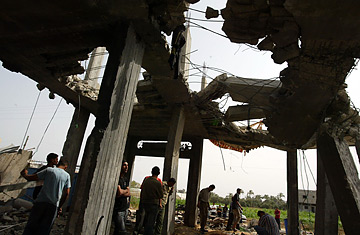
Palestinian men inspect the remains of a metal workshop hit by an Israeli air strike May 20, 2007, in Gaza City.
That warning even applies to Hamas's most senior official, Prime Minister Ismael Haniyeh. After a barrage of Palestinian missiles flew out of Gaza into southern Israel during the past week, the Israelis were in no mood to go lightly on Hamas. On Monday, Israeli Deputy Defense Minister Ephraim Sneh declared in an interview that "no one" in Hamas's leadership was "immune from a strike." Hamas took the threat to heart. Spokesman Ayman Taha also urged militants to stop using cars and gathering in open places where they could be spotted by Israeli aircraft circling over the Gaza strip. "We must be on high alert and very careful," he declared.
Israel, once again, may have succeeded in taking out a few Hamas commanders and slowing the rain of homemade rockets landing on its soil from Gaza. But it has fallen into a familiar trap. Once again, their mutual loathing of Israel has helped warring Palestinian militias overcome their fratricidal tendencies. When the Fatah-Hamas power struggle turns into a shooting war, the most effective way of getting a cease-fire appears to be firing a few dozen badly aimed rockets into southern Israel and then waiting for the Israelis to intervene — which the Israelis invariably do. And when under fire from the Israelis, the Palestinian militants tend to stop killing each other, as happened last Sunday.
The Israelis have focused their fury on Hamas, not Fatah, whose armed gangs are loosely tied to President Mahmoud Abbas, the Palestinian leader preferred by Prime Minister Ehud Olmert and the Bush Administration. Israeli jets scorched Gaza, killing Hamas militants as they prepared to launch rockets or while speeding through the dusty Mediterranean strip. They also blasted warehouses, schools and buildings where Hamas was thought to gather or store arms.
Still, the Palestinian rockets kept coming. An Israeli woman in Sderot, a community within easy rocket range of Gaza, was killed in one attack on Monday. The Israeli Prime Minister visited Sderot on Tuesday, but received an angry reception from the residents — and a few Gaza missiles slammed down nearby, though Olmert and his entourage were never in danger. So far, Olmert is resisting calls by the army to launch a major offensive into the Gaza hornets' nest.
Israel's strategy of targeting only Hamas may actually help the Islamists in their feud with Fatah. After the latest round of selective air strikes, even moderate Palestinians in Gaza are coming around to the Hamas view that their rival Fatah will do anything to regain power, even collude with the enemy Israel. But in the meantime, Hamas commanders are staying off their cellphones.
